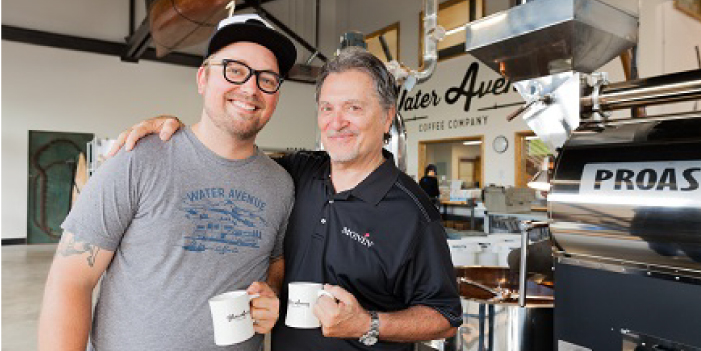
Why Your Coffee Tastes Terrible

Bruce Milletto (right) and his son, Matt, in Water Avenue Coffee's roastery.
You know that feeling: You're eagerly awaiting that first sip of coffee or espresso, it hits your tongue and … something's off. Maybe it's too bitter. Too weak. Too mediocre.
With International Coffee Day on Friday - and as a bank that serves a signature, fair-trade, organic Umpqua Blend in our stores - we wanted to ask a true expert what makes a perfect cup of coffee.
"Most Americans blame a bad cup of coffee in the morning. Very often it's about how it's made," says Bruce Milletto, co-owner of Water Avenue Coffee in Portland, and an Umpqua business customer. Bruce says coffee is a rare thing that can be completely screwed up in the last 20 seconds, even the last 10. "A thousand hands touch coffee and it can be ruined by the last hand," Bruce says, quoting one of his coffee heroes.
So what goes into a great cup of coffee or espresso? A lot:
The product: Coffee bars like Water Avenue measure the amount of coffee, known as "the drop" for coffee and "the dose" for espresso, down to the gram.
The process: A perfect cup of coffee is a seriously complex process. The grind has to be just right: not too coarse, not too fine. Over-extract and your coffee tastes bitter. Under-extract and you're not getting the taste out of all the granules. With an espresso, the temperature and the fineness of the stream affect the taste. The controls have to be set - and reset - throughout the day based on the humidity and pressure in the air. "An espresso machine in Portland isn't going to brew the same cup as a machine in San Francisco," Bruce says.
The people: "You can have the fanciest, most expensive machine, the best coffee beans; but if you don't have that third variable - the human factor - then it doesn't matter," Bruce says. "You're going to get mediocre coffee." A well-trained barista can make all the difference. For instance, Water Avenue built a training room at their roastery, and baristas work for months before pouring a single drop of espresso for a customer in their coffee bars.
And for those at home... Every brewing method has a specific grind. So Bruce says that if you don't grind your beans at home, tell your barista how you like your coffee. In fact, either way, talk to your barista about how you like your coffee, and on this International Coffee Day, raise a cup and thank your baristas for their expert work!





